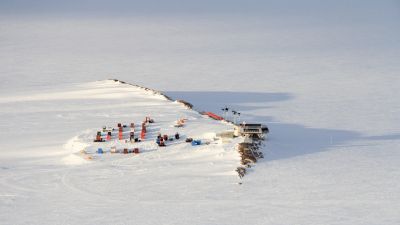
Belgium’s Princess Elisabeth and Prince Philippe Visit Antarctic Station Exhibition
Brussels, 20 May 2013 -- Their Royal Highnesses, Prince Philippe, and his daughter Princess Elisabeth of Belgium, were today welcomed by the International Polar Foundation during their visit to the “Inside the Station” exhibition at Tour & Taxis, Brussels.
“Inside the Station” features an interactive journey inside the iconic zero emission polar research station, Princess Elisabeth Antarctica. The station was named in honour of Her Royal Highness Princess Elisabeth on its inauguration in 2009, so the Foundation takes special pride in the Princess’ visit.
“It is a great honour for the Foundation to welcome our honorary president His Royal Highness Prince Philippe, and Princess Elisabeth to Inside the Station today”, said International Polar Foundation Executive Director Thierry Touchais. “We fondly remember the “good luck” wishes HRH Princess Elisabeth recorded in 2009 for Alain Hubert and the construction team in Antarctica for the station’s inauguration. In a week when 49 foreign delegations are here in Brussels for the Antarctic Treaty Meeting, the Foundation is proud to pursue its mission by sharing the achievement of Princess Elisabeth Antarctica, which continues to showcase Belgium on the international stage”.
Inside the Station features reconstructions of the polar research station and its environment, which give visitors the opportunity to experience to daily life in the frozen South, the importance of polar science, and the continuing evolution of the world’s first zero emission polar research facility, along with:
- The technologies used at Princess Elisabeth Antarctica– the smart grid, the renewable energy systems, the space-age water treatment plant and more
- The incredible Antarctic environment
- Logistics – arduous journeys to and in the Antarctic – using satellites, aircraft, ships, and tractors
- The science – the scientific programmes at Princess Elisabeth Antarctica, which help learn more about our planet’s mechanisms
- Daily life – working, eating, sleeping and managing energy
- Princess Elisabeth Antarctica as an example of how we can deal with climate change – and the actions we can take at a personal and community level to respond to this challenge
- Belgian Antarctic Research Expeditions (BELARE), when more than 30 scientists from Belgium and other countries live and work at Princess Elisabeth Antarctica through the season.
Five years after displaying the polar station at Tour & Taxis, the International Polar Foundation welcomes the public to once again share in the success story that is Princess Elisabeth Antarctica.
Inside the Station opened at Tour & Taxis, Brussels on December 22, 2012, and runs until May 31, 2013.
For more information, including detailed information on ticketing, opening hours and directions, please visit www.insidethestation.be
Family and group rates are available. For more information, contact info@insidethestation.be or +32 (0) 2 549 60 49
Notes for editors:
Press Contact: Dave Walsh
+32 (0) 493 140 966/+32 (0) 2 543 06 98
press@polarfoundation.org
Press pack & press pictures
- Downloadable press pack and press pictures
- ATCM: Antarctic Treaty Consultative Meeting, Brussels 19-29 May 2013:
- Inauguration of Princess Elisabeth Antarctica at Tour & Taxis, September 2007
- Inauguration of the Princess Elisabeth station in Antarctica, February 2009
Princess Elisabeth Antarctica
As an Antarctic legacy project of the 2007-2009 International Polar Year, Princess Elisabeth Antarctica research station was designed and built to respect the letter and spirit of the Madrid Protocol to the Antarctic Treaty. But the project went a step further: Princess Elisabeth is the world’s first Zero Emission polar research station.
Located in East Antarctica’s Sør Rondane Mountains, Princess Elisabeth Antarctica welcomes scientists from around the world to conduct research in this little-studied and pristine environment.
Operated by the International Polar Foundation, in partnership with the Belgian Polar Secretariat, the station is an evolving technical prototype and a strong expression of Belgian ingenuity and innovation. Princess Elisabeth Antarctica’s design and construction seamlessly integrates passive building technologies, renewable wind and solar energy, water treatment facilities, continuously monitored power demand and a smart grid for maximising energy efficiency.
Princess Elisabeth Antarctic was launched at Brussels venue Tour & Taxis in 2007, drawing 35,000 visitors in just four days, before it was shipped to Antarctica for deployment.
The success of Princess Elisabeth Antarctica marks an important development in the philosophy of sustainable development, demonstrating how the climate challenge can be met through goodwill and collaboration between civil society, business and governments. The project proves how readily accessible technology can be harnessed to achieve a low carbon society, without compromising our collective or individual wellbeing.
The energy solutions perfected at Princess Elisabeth Antarctica are already being successfully commercialised by the project’s technical partners for use in mainstream applications.
http://www.antarcticstation.org/
The International Polar Foundation
Based in Brussels, Belgium, the International Polar Foundation recently celebrated 10 years of achievement. Created with the objective of providing a novel interface between science and society, it was recognised by Belgian Royal Statute as a foundation for the public good in 2002.
The International Polar Foundation supports polar scientific research for the advancement of knowledge, the promotion of informed action on climate change, and the development of a sustainable society.
Founded by Belgian polar explorer Alain Hubert, Prof. Hugo Decleir and Prof. André Berger in 2002, the Brussels-based International Polar Foundation provides a novel interface between science and society, and was recognised by Belgian Royal Statute as a foundation for the public good in 2002.
The Foundation seeks to bring about a keener appreciation of the role of science, particularly research in the Polar Regions, through a re-examination of the planet’s interconnections, its fragility, the impact of human actions on the environment, and the evolution of millennial climate cycles.
To achieve its aims, the Foundation has initiated several high-profile projects; this includes supporting polar science through the creation and operation of the wind-and-solar-powered zero emission Princess Elisabeth Antarctica station, logistical support of scientists working in Antarctica, fellowship awards for Antarctic researchers, an annual symposium on Arctic issues, and several science and education websites and classroom activities and resources.
